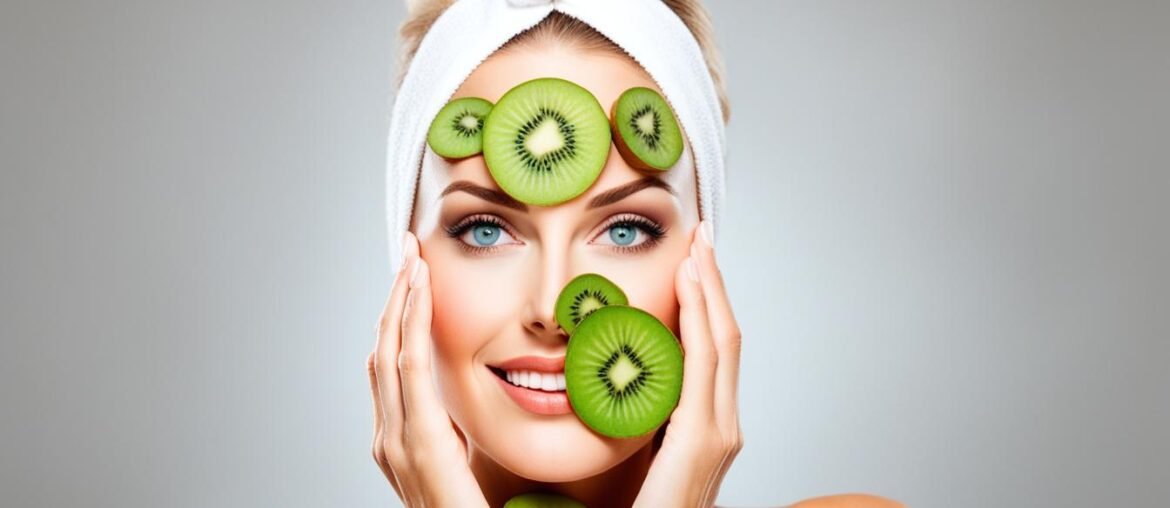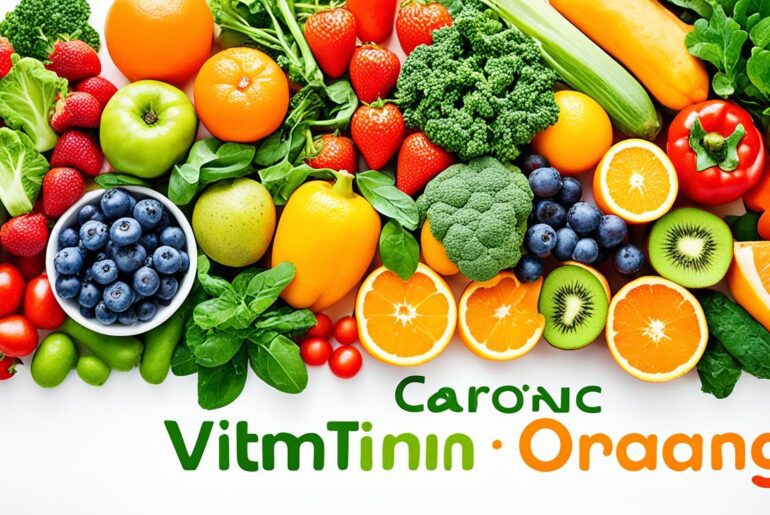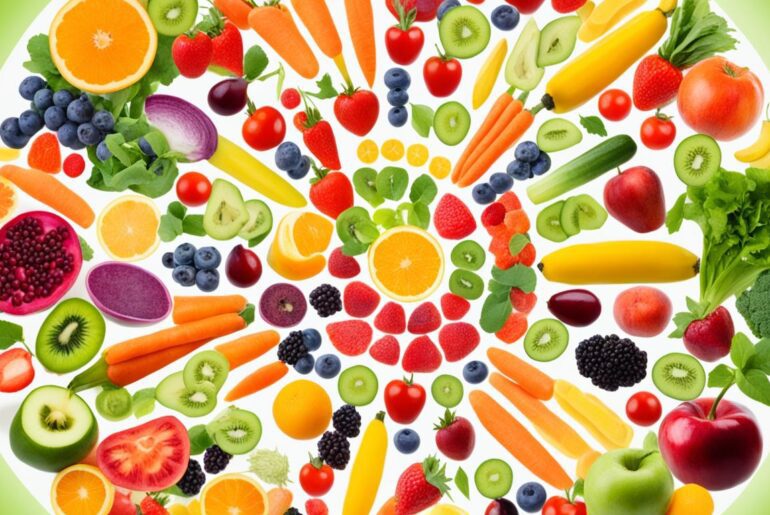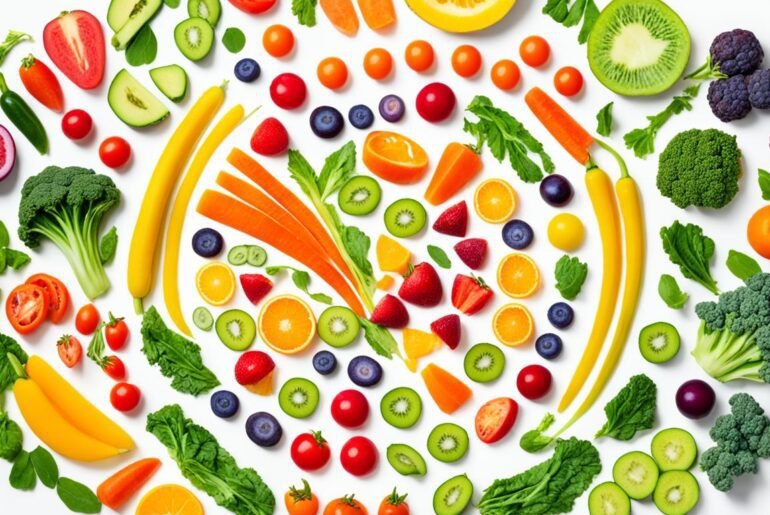As we age, maintaining youthful-looking skin becomes a priority for many people. But what if I told you that the secret to ageless skin could be found in a simple vitamin? That’s right! Essential vitamins are not only crucial for our overall health but also play a significant role in supporting the health and radiance of our skin.
In this article, we will uncover the power of these essential vitamins and explore how they can help you achieve ageless skin. From reducing wrinkles to improving skin hydration, these vitamins hold the key to a healthy complexion. So, are you ready to discover the best vitamins for youthful skin and unlock the secret to ageless beauty?
Key Takeaways:
- Essential vitamins are crucial for maintaining ageless skin and promoting overall health.
- These vitamins play a significant role in reducing wrinkles, improving skin hydration, and enhancing skin elasticity.
- Curcumin, EGCG, collagen, CoQ10, nicotinamide riboside, nicotinamide mononucleotide, crocin, vitamin C, and other anti-aging supplements are some of the key vitamins that support healthy aging and improve skin health.
- Consult a healthcare professional before incorporating any supplements into your routine.
Curcumin
Curcumin, the main active compound found in turmeric, is a powerful antioxidant with potent cellular protective properties. It has been extensively studied for its potential health benefits, including its role in promoting longevity and combating age-related diseases.
Research has shown that curcumin can activate certain proteins that help delay cellular senescence, the gradual deterioration of cell function associated with aging. By preventing or slowing down cellular senescence, curcumin may contribute to the maintenance of healthy cells and tissues over time.
Moreover, curcumin’s antioxidant effects can help protect cells against oxidative damage caused by free radicals. This is important because oxidative stress is linked to the aging process and the development of age-related diseases.
Animal studies have demonstrated curcumin’s potential to increase lifespan and reduce the risk of age-related diseases. For example, a study published in the journal Oncotarget found that curcumin supplementation increased the lifespan of fruit flies by up to 25%.
In addition to its cellular protective properties, curcumin has also been associated with a reduced risk of age-related cognitive decline. Turmeric intake, which is rich in curcumin, has been linked to cognitive benefits such as improved memory and attention in older adults.
Curcumin’s potential as a longevity-promoting compound and its ability to support cognitive health make it a valuable addition to any anti-aging regimen.
| Benefits of Curcumin | Research Findings |
|---|---|
| Delaying cellular senescence | Activation of proteins that promote cellular health and longevity |
| Protecting against oxidative damage | Powerful antioxidant effects that combat free radicals |
| Increasing lifespan | Animal studies show a potential for extended lifespan |
| Reducing the risk of age-related cognitive decline | Associated with improved memory and attention in older adults |
EGCG

EGCG, a polyphenol compound found in green tea, offers impressive health benefits and may promote longevity. It improves mitochondrial function in cells and induces autophagy, the process of removing damaged cellular material.
Green tea intake has been associated with protection against aging skin and reduced hyperpigmentation caused by UV light. Some studies also suggest that daily green tea intake may suppress brain aging and reduce stress.
To fully understand the potential benefits of EGCG, let’s explore its effects on mitochondrial function, autophagy, aging skin, hyperpigmentation, and brain aging.
The Role of EGCG in Mitochondrial Function
The mitochondria are known as the “powerhouses” of our cells, as they produce the energy necessary for cell function. However, as we age, mitochondrial function tends to decline, leading to various age-related health issues.
Research suggests that EGCG can improve mitochondrial function by enhancing the activity of enzymes involved in energy production. By supporting healthy mitochondrial function, EGCG may help combat the effects of aging and promote overall well-being.
EGCG and Autophagy: Clearing Out Cellular Waste
Autophagy is a natural cellular process that helps remove damaged molecules and organelles, ensuring the proper functioning of cells. It plays a crucial role in maintaining cell health and preventing age-related diseases.
Studies have shown that EGCG can induce autophagy, allowing cells to efficiently clear out cellular waste. By promoting autophagy, EGCG may help slow down the aging process and reduce the risk of age-related conditions.
EGCG for Aging Skin and Hyperpigmentation
Aging skin and hyperpigmentation are common concerns as we grow older. Fortunately, green tea and its EGCG content offer potential solutions.
EGCG has antioxidant properties that help neutralize free radicals and protect the skin from oxidative stress, a major contributor to aging skin. It may also inhibit the production of melanin, the pigment responsible for hyperpigmentation.
Incorporating green tea into your skincare routine or using skincare products containing EGCG may help maintain youthful-looking skin and reduce the appearance of hyperpigmentation.
EGCG and Brain Aging
Brain aging is a natural process that can lead to cognitive decline and various neurological disorders. However, research suggests that EGCG may have neuroprotective effects.
Some studies have found that EGCG can enhance memory and learning abilities, protect against neurotoxicity, and reduce inflammation in the brain. These findings indicate that EGCG may play a role in preserving brain function and potentially reducing the risk of age-related cognitive decline.
To summarize, EGCG, found in green tea, offers a range of health benefits, including improved mitochondrial function, induction of autophagy, protection against aging skin and hyperpigmentation, and potential brain-aging suppression. Incorporating green tea into your daily routine or choosing skincare products with EGCG may help promote healthy aging and overall well-being.
Collagen
https://www.youtube.com/watch?v=9BZCqB9gqyg
Collagen is a vital protein that contributes to the structure and strength of our skin. As we age, the natural production of collagen slows down, leading to a decrease in skin elasticity and the appearance of wrinkles. Fortunately, supplementing with collagen can help combat these signs of aging and promote a more youthful complexion.
Studies have shown that collagen supplements have a range of benefits for the skin. They can help reduce the appearance of wrinkles by improving skin elasticity and promoting wrinkle reduction. Collagen also enhances skin hydration, making it a valuable asset for maintaining a healthy complexion. Additionally, collagen supplements have been found to stimulate nail growth, resulting in stronger and healthier nails.
Incorporating collagen supplements into your daily routine can provide significant improvements in skin health and appearance. Whether you choose collagen powders, tablets, or topical creams, these supplements work to replenish the collagen levels in your body and support the natural processes that keep your skin looking youthful and vibrant.
| Benefits of Collagen Supplements: | Scientific Evidence: |
|---|---|
| Reduces the appearance of wrinkles | Several studies have demonstrated the effectiveness of collagen supplementation in reducing wrinkles and improving skin elasticity (1). |
| Improves skin hydration | A study found that participants who took collagen supplements experienced significant improvements in skin hydration and moisture retention (2). |
| Enhances skin elasticity | Research has shown that collagen supplements can increase skin elasticity, leading to firmer and more youthful-looking skin (3). |
| Stimulates nail growth | Collagen supplements have been found to promote nail growth, resulting in stronger and healthier nails (4). |
Supplementing with collagen has been shown to have a positive impact on skin structure, wrinkle reduction, skin hydration, skin elasticity, and nail growth. These benefits can contribute to a more youthful appearance and improved overall skin health.
Whether you’re looking to diminish the appearance of fine lines and wrinkles or improve the health of your skin, collagen supplements can be a valuable addition to your skincare routine. Talk to your healthcare provider or dermatologist to find the best collagen supplement for your specific needs and start enjoying the benefits of youthful-looking skin.
CoQ10

Coenzyme Q10 (CoQ10) is an antioxidant that plays an essential role in energy production and protects against cellular damage. Supplementing with CoQ10 has been shown to improve overall quality of life, reduce physical and mental deterioration, and benefit heart health.
As an antioxidant, CoQ10 helps neutralize harmful free radicals, preventing oxidative damage to cells and tissues. This protection is particularly important for organs that require high energy levels, such as the heart.
CoQ10’s key role in energy production is especially relevant for physical decline. It is an essential component of the mitochondria, the powerhouses of our cells that generate energy. As we age, the natural production of CoQ10 declines, which can lead to decreased energy levels and physical performance. Supplementing with CoQ10 can help boost energy production and alleviate the effects of physical decline.
Heart health is another area where CoQ10 shines. Research has shown that CoQ10 reduces oxidative stress and stiffness in arteries, helping maintain their flexibility and promoting healthy blood flow. It also lowers blood pressure and prevents the buildup of oxidized cholesterol, which can contribute to heart disease.
CoQ10 is a valuable antioxidant that supports energy production and combats physical decline. It plays a crucial role in maintaining heart health and overall well-being. Supplementing with CoQ10 can improve quality of life and protect against age-related health challenges.
Nicotinamide riboside and nicotinamide mononucleotide
Nicotinamide riboside (NR) and nicotinamide mononucleotide (NMN) are two compounds that serve as precursors to nicotinamide adenine dinucleotide (NAD+), a critical molecule involved in various cellular processes.
NAD+ plays a crucial role in energy production, DNA repair, gene expression, and cellular metabolism. As we age, NAD+ levels decline, which can lead to age-related genetic changes and a decrease in various cellular functions.
Supplementing with NR and NMN has shown promising results in boosting NAD+ levels, which may help counteract age-associated genetic changes and maintain cellular integrity. Studies have also indicated that NMN has the potential to significantly lengthen telomeres, the protective caps at the ends of chromosomes that naturally shorten with age.
Studies have shown that NMN significantly lengthens telomere length, a key factor in the aging process.
Crocin

Crocin is a natural pigment found in saffron, a spice derived from the Crocus sativus flower. This vibrant pigment not only lends color to saffron but also offers numerous health benefits. Studies have shown that crocin possesses powerful anti-inflammatory properties, making it a valuable compound for promoting overall well-being.
One of the notable effects of crocin is its ability to combat cellular damage caused by oxidative stress. Oxidative stress occurs when there is an imbalance between free radicals and antioxidants in the body, leading to cellular damage and inflammation. By reducing oxidative stress, crocin helps protect cells from damage and maintains their optimal functioning.
Furthermore, crocin has shown promising cognitive-enhancing effects. Research suggests that it may help prevent age-related cognitive decline by reducing inflammation and oxidative stress in the brain. These properties make crocin a potential natural remedy for maintaining cognitive health and supporting healthy brain function as we age.
To further highlight the benefits of crocin:
- Reduces inflammation: Crocin possesses anti-inflammatory properties that help reduce inflammation in various parts of the body, supporting overall health and well-being.
- Protects against cellular damage: By scavenging free radicals and reducing oxidative stress, crocin helps protect cells from damage and promote cellular health.
- Prevents UV-induced damage: UV light exposure can lead to skin aging and cellular damage. Crocin has shown protective effects against UV light-induced damage, helping maintain healthy skin.
Overall, crocin, found in saffron, is a valuable compound for its anti-inflammatory and cellular protective properties. Its potential cognitive-enhancing effects and ability to combat cellular damage make it an intriguing compound for further research and consideration.
Vitamin C

Vitamin C is an essential nutrient that provides numerous benefits for skin health and overall well-being. As a powerful antioxidant, vitamin C helps protect cells from oxidative damage caused by free radicals. This protection is particularly important for maintaining the health and youthful appearance of the skin. Supplementing with vitamin C can have a significant impact on skin hydration, collagen production, and immune function.
One of the key benefits of vitamin C is its role in supporting collagen production. Collagen is a protein that gives the skin its structure and elasticity. As we age, collagen production naturally declines, leading to the formation of wrinkles and loss of skin firmness. By taking vitamin C supplements, individuals can stimulate collagen synthesis, resulting in smoother, more youthful-looking skin.
In addition to its collagen-promoting effects, vitamin C is also essential for skin hydration. This vitamin helps the skin retain moisture, preventing dryness and improving overall hydration levels. Hydrated skin appears more plump and vibrant, reducing the visibility of fine lines and wrinkles.
Furthermore, vitamin C plays a crucial role in immune function. It supports the production and function of various immune system cells, helping to strengthen the body’s natural defense mechanisms. This is particularly important for older adults who may be at a higher risk of vitamin C deficiency and its associated effects on immune health.
To summarize, vitamin C is an antioxidant powerhouse that offers significant benefits for skin health, collagen production, skin hydration, and immune function. By incorporating vitamin C supplements into your daily routine, you can protect your skin from oxidative damage, maintain a youthful appearance, and support overall well-being.
Other anti-aging supplements

While essential vitamins play a significant role in supporting ageless skin, several other supplements have also shown potential in promoting healthy aging. While more research is needed to fully understand their effects, these supplements offer specific benefits for skin health and overall well-being.
Vitamin E
Vitamin E is a powerful antioxidant known for its ability to protect cells from oxidative damage. It helps reduce inflammation, which can contribute to skin aging, and supports healthy collagen production. Vitamin E can be found in various foods, including nuts, seeds, and vegetable oils.
Theanine
Theanine is a naturally occurring amino acid found in tea leaves, particularly in green tea. It is known for its calming properties and may help reduce stress and promote relaxation. While its direct impact on skin health is still being studied, stress reduction can indirectly benefit the aging process and overall well-being.
Selenium
Selenium is a trace mineral that acts as an antioxidant in the body. It helps neutralize free radicals and protect against oxidative damage. Selenium also supports the immune system and plays a role in thyroid function. Dietary sources of selenium include Brazil nuts, seafood, and organ meats.
Vitamin A
Vitamin A is essential for maintaining healthy skin. It promotes cell turnover, stimulates collagen production, and helps keep the skin hydrated. Vitamin A is found in animal-based foods as retinol and in plant-based foods as beta-carotene, which the body can convert to vitamin A.
Resveratrol
Resveratrol is a polyphenol compound found in certain fruits and plants, including red grapes and berries. It has been shown to have potent antioxidant and anti-inflammatory properties. Resveratrol may help protect skin cells from oxidative damage and support healthy aging.
Zinc
Zinc is an essential mineral that plays a role in numerous bodily functions, including wound healing and collagen synthesis. It also has antioxidant properties and supports the immune system. Good dietary sources of zinc include seafood, meat, nuts, and seeds.
Curcumin
Curcumin, mentioned earlier in this article, is the main active compound in turmeric. It has powerful antioxidant and anti-inflammatory effects, which can support healthy aging. Curcumin also offers potential benefits for skin health and may have anti-aging properties.
Summary
While essential vitamins are crucial for ageless skin, other supplements such as vitamin E, theanine, selenium, vitamin A, resveratrol, zinc, and curcumin have shown promise in promoting healthy aging. These supplements offer a range of benefits, including reducing inflammation, protecting against oxidative damage, improving collagen production, and supporting overall well-being. However, it is important to consult with a healthcare professional before adding any supplements to your routine.
Conclusion
Essential vitamins are key to maintaining ageless skin. Curcumin, EGCG, collagen, CoQ10, nicotinamide riboside, nicotinamide mononucleotide, crocin, vitamin C, and other anti-aging supplements have all been shown to support healthy aging and improve skin health. By incorporating these essential vitamins into your diet or taking them as supplements, you can slow down certain aging processes, protect against age-related diseases, and enhance the health and radiance of your skin.
It’s important to note that before adding any supplements to your routine, it’s always wise to consult with a healthcare professional. They can provide personalized guidance and ensure that the selected supplements are safe and suitable for your specific needs.
So, whether you’re looking to reduce wrinkles, improve skin hydration, or enhance overall skin health, consider adding these essential vitamins for ageless skin to your daily routine and age gracefully with confidence.
FAQ
What are the essential vitamins for ageless skin?
The essential vitamins for ageless skin include curcumin, EGCG, collagen, CoQ10, nicotinamide riboside, nicotinamide mononucleotide, crocin, and vitamin C, among others.
What is curcumin, and how does it benefit the skin?
Curcumin is the main active compound found in turmeric. It has powerful antioxidant effects and cellular protective properties, promoting longevity and reducing the risk of age-related diseases.
How does EGCG contribute to ageless skin?
EGCG is a compound found in green tea that improves mitochondrial function in cells and induces autophagy. It is associated with protection against aging skin, reduced hyperpigmentation, and potential benefits for brain aging.
How can collagen improve the health and appearance of the skin?
Collagen is a protein that helps maintain skin structure. Supplementing with collagen has been shown to reduce signs of aging, including wrinkles and dry skin. It improves skin hydration, elasticity, and nail growth.
What are the benefits of CoQ10 for healthy aging?
CoQ10 is an antioxidant that protects against cellular damage and plays a vital role in energy production. Supplementing with CoQ10 improves overall quality of life, reduces physical and mental deterioration, and benefits heart health.
What are nicotinamide riboside and nicotinamide mononucleotide, and how do they relate to ageless skin?
Nicotinamide riboside and nicotinamide mononucleotide are precursors to the compound nicotinamide adenine dinucleotide (NAD+), which is involved in critical cellular processes. Supplementing with these compounds boosts NAD+ levels and may prevent age-associated genetic changes.
What benefits does crocin, found in saffron, offer for ageless skin?
Crocin, a pigment found in saffron, has anti-inflammatory and cognitive-enhancing effects. It combats cellular damage, reduces inflammation, and protects against damage caused by UV light. Crocin may promote longevity and prevent age-related cognitive decline.
How does vitamin C contribute to ageless skin?
Vitamin C is a powerful antioxidant that protects cells from oxidative damage. It improves skin hydration, stimulates collagen production, and protects against wrinkle development and premature aging from sun exposure. Vitamin C also enhances immune function.
What other anti-aging supplements are recommended for skin health?
Other supplements that may support healthy aging and skin health include vitamin E, theanine, selenium, vitamin A, resveratrol, zinc, and curcumin. These supplements have specific benefits such as reducing inflammation, protecting against oxidative damage, improving collagen production, and promoting longevity.
What is the conclusion regarding essential vitamins for ageless skin?
Essential vitamins such as curcumin, EGCG, collagen, CoQ10, nicotinamide riboside, nicotinamide mononucleotide, crocin, and vitamin C have been shown to support healthy aging and improve skin health. Incorporating these vitamins into your diet or taking them as supplements can help slow down certain aging processes, protect against age-related diseases, and enhance the health and radiance of your skin.




